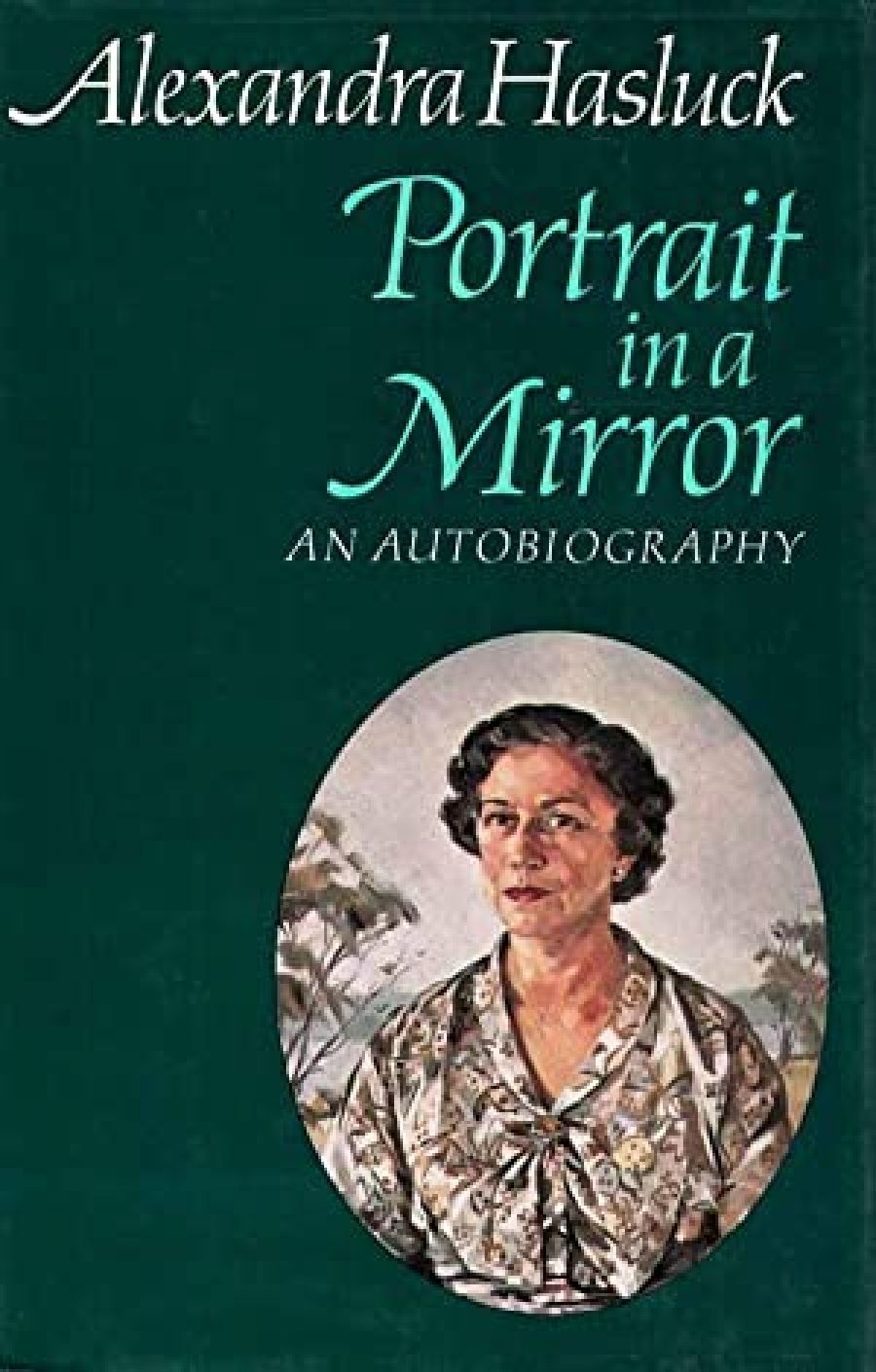
- Free Article: No
- Contents Category: Biography
- Review Article: Yes
- Online Only: No
- Custom Highlight Text:
Following her husband’s excellent autobiography of his early years, Mucking About (1977), Alexandra Hasluck’s own life story has been eagerly awaited. And it has been worth the wait. Portrait in a Mirror is one of only a handful of good autobiographies by Australian public figures. Its 322 pages are full of colour, with some excellent passages of prose, particularly her warm, evocative descriptions of the Australian countryside. Hers is essentially a feminine, empathetic view of the world.
- Book 1 Title: Portrait in a Mirror
- Book 1 Subtitle: An autobiography
- Book 1 Biblio: OUP, $22.50 hb
One of the most interesting chapters deals with her fifteen months in New York at the end of World War II when Paul headed the Australian delegation to the United Nations. Others describe Paul’s entry into federal parliament as MHR for the new Perth seat of Curtin, her travels with him as minister for territories, and their years at Yarralumla when Paul was governor-general. The book ends with the Haslucks finishing their term at Yarralumla in 1974 and returning to retirement in Perth.
Alexandra also discusses her life as a writer. And this autobiography, not to mention the twelve previous books to her credit, is a testimony to her skills as a writer and historian. The chapters on her forebears have some interesting social and historical sketches.
We see in her story the other side of her husband the successful diplomat, politician, and governor-general. At home he was often moody, self-doubting, and just plain hard to live with.
The author is fair in her observations of academics, other writers, diplomats and politicians; even the Whitlams are given their due. The one exception is ‘Doc’ Evatt. She claims that Evatt, as minister for external affairs in the Chifley government, came to dislike her husband, after cultivating him and appointing him to head the Australian UN delegation. In early 1947, when Paul was due to become president on the UN Security Council, Evatt ordered the Australian ambassador in Washington, Norman Makin, to take his place. It would appear that Evatt, later president of the UN General Assembly, wanted all the limelight himself. Describing Evatt as a ‘jealous, smallminded man’, she recalls that their home life at the time was ‘at touch point, and I cannot forgive Evatt for it’.
Alexandra gives us some interesting clues as to what makes her ‘tick’. She is fiercely patriotic. She is also very much a Western Australian – one of the breed of ‘sandgropers’ educated in the 1920s who became outstanding academics, diplomats, politicians and legal figures – including H.C. Coombs, John La Nauze, Mr Justice Edward Dunphy, and Mr Justice Sir John Virtue.
What sustained her as wife of a hardworking public figure and gave her the energy, let alone the time, to rear two sons and to write prolifically? She mentions the motto of her maternal relations – the Hills – Nec Tente aut Perfice – Attempt not, or Accomplish. Writing became her way of release from the demands of wife, mother and public figure. By the time Paul Hasluck was offered the appointment of governor-general, writing had become so important to her that she made a bargain: she would happily share his vice-regal duties provided she had time to herself ‘each day whenever possible, to be undisturbed and consideration given to work’.
The only unsatisfactory note in the book is surprisingly when it comes to politics; then the author sometimes has a righteous innocence, the Evatt episode excepted. Take, for instance, these comments on the on the enormously complex issue of Vietnam:
I just wonder now if all those people who demonstrated so strenuously against continued aid to South Vietnam are happy to read about all the refugees leaving that unhappy land, and are pleased to think that they helped to create a new race of emigrants to our country – the Boat People.
Or again about Paul’s not very determined leadership challenge after Holt’s death in 1968; once John Gorton won the ballot: ‘I did not hesitate to make known my disgust with a party that was so bad a judge of men. I have had little faith in it ever since.’
But these are minor quibbles in what is a very enjoyable autobiography, one of the best produced to date by an Australian.


Comments powered by CComment